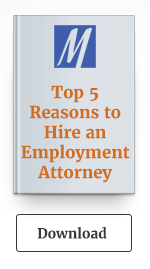 "Whistleblower" workplace laws are intended to protect employees who complain of illegal conduct by an employer, including harassment, discrimination, wage theft, and safety violations. Watchdog employees, those whose role is to monitor employer compliance with relevant laws and regulations, have a right under state and federal laws to report those activities like any other employee. But, for some, the fear of adverse employment action can inhibit their responsibilities.
"Whistleblower" workplace laws are intended to protect employees who complain of illegal conduct by an employer, including harassment, discrimination, wage theft, and safety violations. Watchdog employees, those whose role is to monitor employer compliance with relevant laws and regulations, have a right under state and federal laws to report those activities like any other employee. But, for some, the fear of adverse employment action can inhibit their responsibilities.
What is an Adverse Employment Action?
An adverse employment action, also known as retaliation, is any significant negative action taken toward an employee. This can include wrongful termination, demotion, constructive discharge, failure to hire, being passed up for a promotion, retraction of benefits, or being disciplined.
Some adverse employment actions are legally actionable. Adverse employment actions taken for improper reasons, including those based on discriminatory reasons, for example, can violate New Jersey or federal laws.
NJ Adverse Employment Action Law (N.J.S.A. 34:19-2e)
One such law is the Conscientious Employee Protections Act (“CEPA”), at N.J.S.A. 34:19-2e. This law protects employees from “retaliatory action” for being a whistleblower. "Retaliatory action" is defined as “the discharge, suspension or demotion of an employee, or other adverse employment action taken against an employee in the terms and conditions of employment.”
To prove retaliation, you must show you engaged in protected activity (such as participating in an OSHA investigation of safety violations at your workplace), that your employer took some adverse action against you (such as firing you), and that the adverse action had a retaliatory motivation, i.e., you were punished because of your complaint.
Adverse Employment Action in the NJ News
Recently in the news, Joel Lippman, World-Wide Vice-President of Medical Affairs and Chief Medical Officer at Ethicon, Inc., who helped oversee product safety, claimed he was fired in 2006 in retaliation for raising concerns about the safety of some products. Ethicon, a subsidiary of Johnson & Johnson, manufactures surgical devices and is based in Somerville, New Jersey.
According to court papers, Ethicon defended against the allegations, claiming that Lippman was fired because he engaged in an inappropriate relationship with someone who worked under his authority. Lippman claimed the company pretextually used the relationship as an excuse to fire him because he was bringing forward a number of safety problems with the company’s products at that time. He filed a whistleblower retaliation lawsuit against the company under the New Jersey Conscientious Employee Protection Act (CEPA).
New Jersey's highest court recently voted 5-0 in favor of Lippman, holding that his termination was improperly based on retaliatory motives as a result of his whistleblowing activity.
Victims of Adverse Employment Action Should Not Delay
If you are a “watchdog employee,” responsible for protecting the well-being of your fellow employees or consumer safety, you should not be afraid of getting fired for doing your job. If you believe an adverse employment action was taken against you in retaliation for your whistleblowing activities, contact the experienced employment attorneys at the Mark Law Firm right away. We will help you determine if you have a claim for protected whistleblowing activities and pursue action if appropriate.
To schedule an appointment at the Basking Ridge, Oradell, or Newark, New Jersey, law offices of Mark Law Firm, contact the firm online or call 908-375-6767, 973-447-4494, 201-431-7541 today.



.svg)